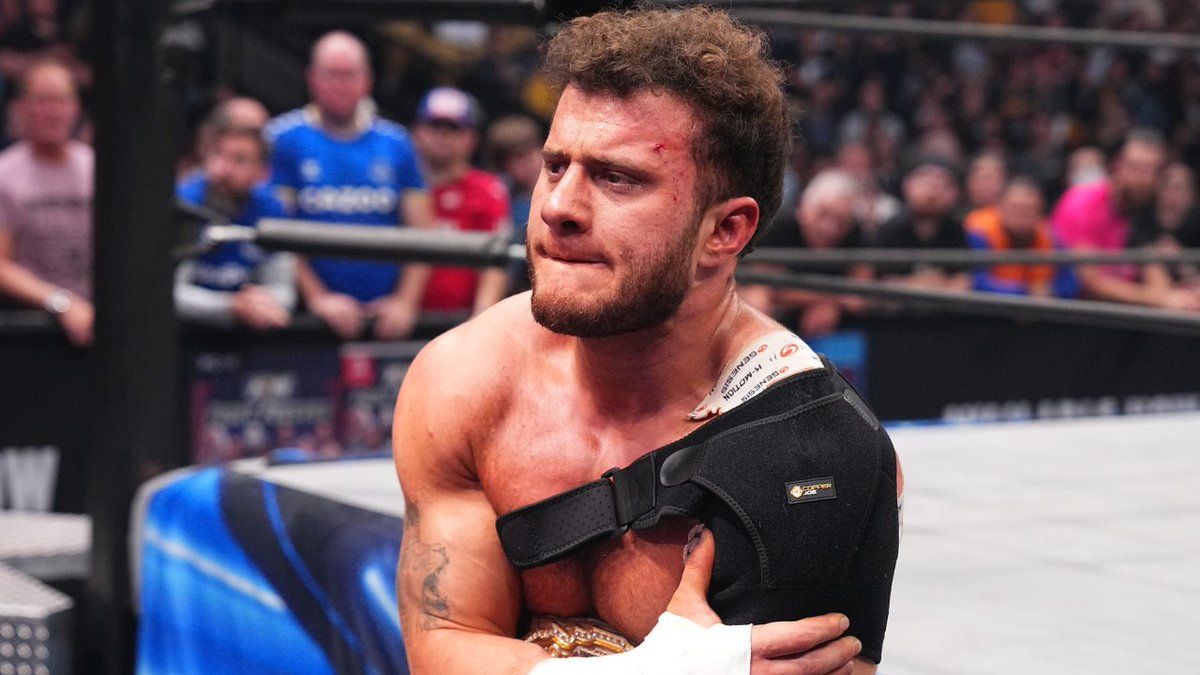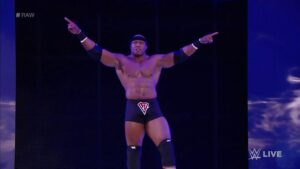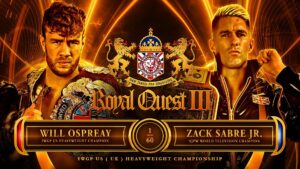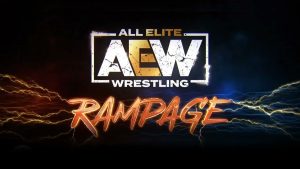As Neurodiversity Awareness Month ends, I am going to explore how neurodivergent wrestlers have and are shaping wrestling. I also want to discuss how neurodivergent folks, both WWE and AEW wrestlers, fans and non-fans experience the world differently. Pulling the curtain back so you can get a behind-the-scenes glimpse was what it’s like behind the performance many neurodivergent people display to the world.
Elevating Awareness
On AEW’s Hey! (EW) Youtube show, AEW megastar Will Ospreay talked publicly about a part of himself many would not have noticed when he is in the ring or as a character onscreen. Besides being one of the best wrestlers in the world, Will has two confirmed life-long learning difficulties: ADHD and dyslexia. Ospreay may also be autistic.
However, he has yet to be formally diagnosed. Many fans on X were surprised and supportive.
The positive response and praise Will received for talking openly and honestly about what our culture, at times, still perceives as weaknesses is deserved. Despite that it is estimated up to 15-20% of the world’s population is neurodivergent, there are still large misconceptions, misunderstandings, and prejudices.
Neurodivergence is an umbrella term that includes a range of conditions such as ADHD, dyslexia, autism, dyspraxia, Tourette’s, and others. Being neurodivergent at its simplest means our brains are wired differently. There are oversimplifications.
Culturally, there is still a lingering perception that being neurodivergent means you may not be as “good” as neurotypicals (everyone else, “normal”). Yet in wrestling, neurodivergent wrestlers and personalities have shaped and will continue to shape all aspects of the business.
There’s also ignorance in the other direction with the assertion that being neurodivergent is a superpower. That again is oversimplification. In wrestling, it’s likely some of the benefits of neurodivergence have aided wrestlers and personalities in their success. Yet depending on the condition (or combination of conditions), even a neurodivergent wrestler may struggle with what are perceived as “simple” daily tasks.
This is a complex and very personal topic for me. Not all aspects of neurodivergence can or will be covered. However, like my previous contribution to Black History Month, I wanted to provide, even if brief, an insight into the experiences of another group who have been overlooked historically for their contributions to wrestling.
You Can’t See Us
If you saw me at a wrestling event, I would look no different to any other fan. Look closely and you might notice how I tilt the left side of my head like a radar dish towards the person speaking. Or I switch places to the speaker’s right side. Talk to me and I might be staring hard at your lips in a noisy space.
I might look weird, but I am overcompensating. I’m partially deaf in my right ear. No, I was born that way. A hearing aid won’t fix it, although it benefits others. This is a physical disability and not a learning one, but undoubtedly it impacts my learning difficulties.
Talking, I might say the wrong wrestler’s name. Call Finn Balor Finn Banana without blinking an eye. At worst you might think I was stupid or experiencing word salad. It’s dyslexia. Yes, it also impacts reading, but not exclusively.
It’s the most notable symptom because it’s often the most talked about. Learning to read is vital and elementary. So having difficulties with reading has been made a source of embarrassment and an obvious tell.
Ospreay discussed he had to have someone else read out his AEW contract. WWE’s Otis, another dyslexic, has spoken publically about the company helping him to learn to read. He publicly shared his achievement of reading his first book (Pet Cemetery– a great choice!) on Instagram in 2022.
Like John Cena, who reportedly may be OCD, you can’t see us. Learning difficulties are often invisible.
Sidebar on Autism
Autism, differently from other learning difficulties, has a history of discrimination and negative connotations. When Will Ospreay said he might be autistic, I know some folks will say ‘But he doesn’t look autistic’. As a teacher, I’ve heard kids, other staff, and parents say this about autistic students. Likewise, the sentiment “but he/she doesn’t act autistic” is also deeply problematic.
There isn’t a set look or set of rules for how autistic people might act or present themselves. Although TV shows and films have created archetypes of autistic people, from Rain Man to Sheldon in The Big Bang Theory. Or in wrestling WWE’s Eugene. These depictions are built on stereotypes that pigeonhole autistic people. Autistic people are a diverse group with a range of strengths, weaknesses, and needs.
As a teacher, I’ve taught dozens of autistic students. Some may have one or more of the stereotypical autistic traits. Not making eye contact. Taking what’s been said literally. Some have difficulties with communicating their feelings or emotions.
Others defy stereotyping. I have autistic students who are more sociable than I will ever be. Who communicate freely and have emotional intelligence that surpasses their young age. Some have wicked senses of humour. Students like Will Ospreay, are extroverts, boisterous and enjoy physicality.
No Cookie Cutter Mould
Wrestlers come in various shapes and sizes with varying styles. So do learning difficulties. Again, you can’t always tell someone’s appearance that their brain is wired differently.
The following wrestling personalities are distinct individuals. However, they share one thing in common besides having worked for WWE and being wrestling personalities.
Batista, Mark Henry, Diamond Dallas Page, CJ Perry/Lana and Vince McMahon.
They are all dyslexic.
Here’s another string of former and current AEW wrestlers: MJF, Joey Janela, Nick Comoroto and Matt Morgan.
They all live with ADHD. This is a condition that means individuals have difficulties with paying attention, sensory stimulation, and physical and mental restlessness. Like other sports and performance arts, wrestling is physical and frenetic. For some, it can help them channel that energy. It allows them to use their ADHD as a strength.
Learning difficulties don’t come in cookie-cutter moulds. There is some crossover between learning difficulties such as difficulties with memory, organisation, and communication.
However, difficulties can vary from person to person. Even within conditions, there are a wide variety of profiles. We are a diverse roster. If we were wrestlers in a WWE 2K game, our stats if presented on a dartboard graph would be asymmetrical stars. Full of tall peaks, our strengths, and huge dips, our weaknesses. The latter would usually be hidden. Because like in wrestling, neurotypicals can use a mask to hide their difficulties.
Overcompensating
The wrestling cliché to develop a strong character is that you turn your volume up to eleven. I’d argue some neurotypical, not just wrestlers, naturally. Some neurotypicals learn to overcompensate and hide their weaknesses. It’s Paul Heyman’s ECW philosophy. You exaggerate the positives and hide the negatives.
Think of those neurodivergent wrestlers who have mastered various strengths to convince us they’re superstars or gods. Whether through talk, their acting, their athleticism, or their creativity.
DDP on “Chasing Glory with Lilian Garcia” explained how he got through high school when he couldn’t read:
“They wanted me to read something on the board, I couldn’t read it, so I’d get myself in trouble and get sent to the principal’s office. What got me through school was being, just, I think being nice to everybody. Anytime there was any kind of talking in any kind of segment in school, I was all about it. And that’s what I learned, through repetition. I barely graduated with enough credits, so to speak, for high school. I didn’t start to learn to read until I was 30.” Quote taken from Sportskeeda.com.
A term that relates sounds somewhat lucha inspired: “masking”. Literally to mask the issues to hide and pretend to be like everyone else. Some dyslexics and ADHD individuals and wrestlers are phenomenal talkers because it distracts from their weaknesses.
Think about AEW wrestler MJF’s incredible articulation and promos. Consider how in one promo MJF revealed feeling inadequate because a teacher at school picked on him due to his inability to focus. It’s relatable.
Sports and arts for some can become an outlet because our weaknesses are not used. Our strengths can become a multi-purpose tool. Unfortunately, they are not applicable or useful for every situation.
Work Harder
Issues in school are common problems for many neurotypicals. Those who have a diagnosis might like MJF feel picked on and pigeon-holed. Others like myself thrived to a point but went undiagnosed until later in life. As was the case for Mark Henry and CJ Perry.
Perry, like me, only found out she was dyslexic at university. How can you make it through years of exams and education without knowing this? Overcompensating and working incredibly hard.
“It took a lot of self-discipline for me, as a little girl, to find that resilience to keep reading slowly, even if it was just The Cat in the Hat—to keep on trying and not give up. I have always had to prove my doubters and naysayers wrong, and that has taught me resilience that I carry through entertainment, through WWE, through life in general.” CJ Perry. Quote taken from Sportskeeda.com.
I tell students with learning difficulties daily it’s unfair, but we will have to work harder. According to some researchers, this might be a reason why some notable neurotypicals become successful. Addressing difficulties can allow neurodivergent to be creative, develop self-discipline and solve problems.
Batista, who now reads and performs scripts in Hollywood movies, shared a similar sentiment to Perry.
“I am also a sufferer of slight dyslexia! Not joking.. focus my man and go over things twice, thrice if necessary.” Dave Bautista. Quote taken from X.
Contributions to This Business
From the names listed earlier, let’s recognise that six of the eleven wrestlers mentioned have held world championships everywhere from AEW, ECW (revival) WCW and WWE.
Many have become polymaths proving to be successful beyond the wrestling industry. DDP as an entrepreneur developed his system of yoga (DDP Yoga). Beyond acting, Batista invests in various companies, including a whiskey distillery.
The two businessmen who shaped the modern pro wrestling landscape overcome dyslexia: Ted Turner and Vince McMahon. In both cases, both men showed resilience, creativity, and adaptability to build business empires. The ripples of The Monday Night Wars are felt to this day with WWE vs. AEW tribalism.
Vince particularly overcame dyslexia ADHD and other issues in his childhood. To be clear, overcoming learning difficulties does not override or excuse Vince’s controversial choices of behaviour both inside and outside of the wrestling business. However, his impact, whether we like it or not, is ingrained in the business.
Then, now, and forever. Given English and words are often viewed as an inherent weakness for dyslexics, it’s somewhat ironic that Vince’s legacy impacts the language we use when discussing wrestling.
However, I must acknowledge that the wrestlers discussed so far only represent a small segment of the neurodivergent experience. Others have not had national or global exposure and are trailblazers of wider neurodivergent experiences.
Overcoming Physical Limitations
There are some whose neurodivergence impacts their motor skills and coordination. Even aspects of their body, like muscle strength and definition. These are features of dyspraxia and some forms of autism. I learned about dyspraxia from my partner who is dyspraxic.
Also known as Clumsy Child Syndrome, its effects can vary. My partner’s parents were told her dyspraxia was severe. That she might have to use a wheelchair when she grew up. She doesn’t and she can walk. Although she struggles with stamina, balance, and weak ankles. The latter have sometimes randomly given out mid-walk. She’ll tumble like a wrestling referee bumping. Despite her limitations, she persists and does the best she can.
Some wrestlers have overcome a visible physical disability. Like Zack Gowen and Gregory Irons. In my ignorance, I wondered if there had been at least one dyspraxic wrestler. There has been at least one. And like me and Ospreay, he’s an Englishman. Pop Sensation Jayson Mason is an indie wrestler from the Northeast of England.
“As a child, I struggled to keep my balance and split my head open three times, so you’d expect that performing complex wrestling moves would be completely out of reach… I struggled to perform many of the most basic moves when I first started and was told on many occasions that I should give up… [Wrestling] didn’t cause my dyspraxia to go away; I couldn’t just flick a switch and say “I have perfect co-ordination now”. Some moves which took others minutes to learn took me weeks.” Jayson Mason. The quote is taken from Teeside Live.
Realistically, Mason knows his limitations. He knows he will not be able to hit a moonsault, let alone a split-legged moonsault like Rob Van Dam. Regardless, the fact Mason’s been able to live his dream and pursue his passion is tremendous.
Autistic Trailblazers
Brian Zane is a trained pro wrestler, commentator, manager, interviewer, ring announcer and wrestling authority figure. “The Influencer” also has his own YouTube channel dedicated to discussing the funniest aspects of wrestling. His Wrestling With Wregret YouTube channel has 373K subscribers and continues to grow.
A one-time ROH employee also, Zane approaches wrestling with both humour and insight. His videos have been stable of my weekly wrestling viewing for the past decade.
Others are up-and-coming in the industry. Traevon Jordan is 26 and competes for Northeast Wrestling where he has held both their heavyweight championship and tag team championship. Traevon has competed for GCW and AEW’s Dark Elevation. In his spare time, Jordan is an autism advocate who seeks to make a difference in the lives of other young people with autism.
Luke ‘Twitch’ DiSangro has autism, ADHD, Tourette’s and OCD. He also helped make one of Wrestlemania XL’s biggest pops happen by showing Philadelphia Eagles players Jason Kelce and Lane Johnson how to run the ropes.
“I’ve always felt like I was an underdog…In one way or another, I’ve always felt like I had to fight from underneath just to stay at the same level as the other kids.” Luke DiSangro, The Philadelphia Inquirer.
Autistic Female Representation
Autism among women can often be overlooked. Particularly as sometimes, women who are autistic do not present their difficulties in the same way as men. Boys are more likely to be diagnosed than girls. 4 to 1 according to the Child Mind Institute. Culturally, there are some traits of autism in girls that have been overlooked due to gender stereotyping of girl’s behaviour.
Charlie Pierce, who has also wrestled as Charlie Kruel and Hardcore Charles, is 26 from Indiana and is a 6-year veteran. Pierce has ADHD and Autism. She has wrestled for OVW and on AEW Dark Elevation where she wrestled another Indiana native, AEW star Ruby Soho.
Being Autistic made learning to wrestle challenging for Pierce. In an interview with Wrestling with Entertainment, Pierce explained how it took her a month to learn how to bump. She still and will likely continue to struggle calling and remembering spots in the ring. Yet her Autism has given her the creativity to create her personas.
“It’s part of me. It’s what makes me me.” Charlie Pierce, Wrestling with Entertainment.
Suffering from social anxiety, being backstage can be difficult, but Pierce keeps herself to herself. Not out of rudeness. It’s to mentally prepare and minimize her social anxiety, which can be another aspect of some Autistic individual’s experience.
Like Jordan, Pierce has supported autistic youths in the past and would love to be a motivational speaker. She strongly believes that:
“Autism doesn’t stop you from doing anything you want to do.” Charlie Pierce, Wrestling with Entertainment.
Warning: Toxic Positivity
This article is a celebration of the achievements and recognition of how neurodivergent people have impacted wrestling. Although I have included comments on the difficulties of neurodivergence, including my own experiences, there is a danger that inadvertently you may interpret a simplistic and incorrect narrative.
Neurodivergence isn’t just overcome with enough hard work alone. You also need the right support, the understanding of others and opportunities that allow you to achieve your potential.
The slogan that you can do anything if you put your mind to it should include an asterisk. For a variety of complex reasons that experts, including other neurodivergent folks, can explain better than myself, it’s not that simple. For some of us, there are limitations. As a dyspraxic, Jayson Mason will never be a high-flying wrestler. Some limitations cannot be removed with hard work alone.
It doesn’t mean folks can’t or won’t find success. Sometimes positivity causes more harm than help. Sometimes positivity itself can be discriminating because it ignores the issues, concerns, or feelings of neurodivergent. Telling someone that positivity can help them change and adapt to difficulty rather can be easier than making changes/adaptions to accommodate their needs.
Fans’ Responsibility
Wrestling fans get accused of being fickle and treating wrestlers not like people. Each week there are reports of fan abuse online or in buildings against wrestlers like Maxine Dupree or Liv Morgan. Folks with neurodivergent experience confrontations like this online and in real life.
As a dyslexic and partially deaf English teacher, I have, and will continue to be asked the same question: How? The real feelings behind this question vary. Sometimes it’s with admiration. Sometimes with ignorance and a genuine desire to learn. At its worst, it’s loaded. The expectation is I justify how I can do my job.
At times I’ve even been confronted by parents and students who have outright said my dyslexia means I can’t do my job. Not shouldn’t, as if it is wrong of me to be working with students when I have issues with spelling. It can’t. I should not be allowed to do my job.
Learning I was dyslexic later in life spared me from the explicit prejudice many of my students have heard from peers and even their own families. They have been told what their limitations are. However, I still have moments of feeling inadequate. When as a writer, despite proofreading an article 4 or 5 times, a spelling mistake will slip through.
This makes me feel like a failure. An imposter. Less than. This happens because our cultural prejudices have made me feel abnormal.
Ableism (discrimination of disabilities) and mentalism (discrimination due to someone’s neurological differences) are unfortunately things many neurodivergent folk experience.
When fans online use language that relates to disabilities as insults, it can hurt more than the person who is being insulted. It also harms those who like me will read those comments. It’s mentally scarring being called these words to imply we are less than others.
It’s One Part of Us
Neurodivergence is only one aspect of ourselves. Dyslexia is part of me. It’s helped me work harder. To have resilience. To see the world differently in a way that allows my creativity to be different from other people. It helps more than hinders my writing due to practice. It’s one aspect of me, not the whole person.
As trainee wrestler/referee Lili Edea wrote on X on 18th October 2022 to MJF:
“Not a Q but thanks for incorporating your ADHD in a way that it’s a part of who you are, but not something you want sympathy for I’m an autistic wrestler who’s been training 2 years, it’s part of who I am, but I also don’t want to be typecast for it either.” Quote taken from X.
Former AEW World Champion MJF’s response:
“Mental disabilities don’t define us. Be who you want to be.” Quote taken from X.
Taking the Brass Ring
Success is important to celebrate. Neurodivergent folks have helped forge the industry. Others are blazing trails for those who have not been openly represented before. Will Ospreay may be the first world champion to be autistic, but other wrestlers like Treavor Jordan, Luke DiSangro and Charlie Pierce may follow suit. Over time we will see more autistic and neurodivergent representation in wrestling.
Some successes may not lead to superstardom like Jason Mayson. Regardless, their example should be recognised. In Florida, Ricky Mundro is a 45-year-old wrestling promoter. Mundro owns Legacy Classic Championship Wrestling and has trained to become a pro wrestler.
His persona, Ricky Autistic, he has adopted because he wants to inspire other autistic individuals to pursue their dreams. Mundro is also a trained member of the fire department. He has training in paramedics, firefighters, search and rescue, traffic and radio control.
Beyond the ring, WWE-obsessed fan Sam Ellenport took a chance and grabbed the brass ring. Obsessed with wrestling plush dolls, Sam contacted Uncanny Brands, who make “Bleacher Creatures” plush dolls with a suggestion. That suggestion was taken on board. It also leads to Sam being hired as a content creator.
The company’s president, Matthew Hoffman saw that Sam’s unique perspective and special interest could help the company grow. Speaking to CNSNews, Hoffman said:
“Sammy was getting better and better, started taking classes…He keeps on progressing and getting better, and now he’s part of our company. It’s incredible…For kids who have autism, finding their interest, and building skills around their interest, I think can be a real road to success.” Matthew Hoffman, CBSNews.
More to Do: In and Beyond the Ring
More work can still be done to make wrestling inclusive. When writing in another article on Will Ospreay, I suggested that, if Ospreay is comfortable with it, presenting his neurodivergence could help inspire others. Others sharing their experiences, whether it’s WWE’s Otis or independent wrestlers like Treavon Jordan or Charlie Pierce, will only help and normalise discussing and supporting neurodivergent people.
Beyond the ring, AEW’s work with KultureCity has helped make their events inclusive with break rooms and other support available for those with sensory difficulties. WWE through charity and outreach work have supported those with neurodivergent and physical disabilities. However, WWE could learn from AEW how to also make all their events inclusive (as well as other things related to attracting wrestlers).
As mentioned, as fans, we have a responsibility to not just the wrestlers but each other to think and act carefully. One of the by-products of tribalism is the intense hatred and othering of those who like something different. Underneath our preferences, whether neurodivergent or neurotypical, we are all fans. We are all human beings.
More From LWOS Pro Wrestling
Header photo – AEW – Stay tuned to the Last Word on Pro Wrestling for more on this and other stories from around the world of wrestling, as they develop. You can always count on LWOPW to be on top of the major news in the wrestling world. As well as to provide you with analysis, previews, videos, interviews, and editorials on the wrestling world. You can catch AEW Dynamite on Wednesday nights at 8 PM ET on TBS. AEW Rampage airs on TNT at 10 PM EST every Friday night. AEW Collision airs Saturday at 8pm Eastern on TNT. More AEW content available on their YouTube.






